A cross-section of citizens in Central Equatoria State has voiced concerns about the recently approved SSP 72.3 billion draft state budget for the 2025/2026 fiscal year, demanding transparency, accountability, and a renewed focus on essential public services.
The reactions follow Monday’s approval of the budget by the State Council of Ministers, chaired by Governor Rabi Mujung Emmanuel.
Speaking to the media after Monday’s meeting, Acting State Information Minister Jacob Aligo announced that the cabinet approved the SSP 72.3 billion draft budget following a presentation by the State Finance Minister Salah Rajab Bunduki.
“The Cabinet has deliberated on the draft budget for the 2025/2026 fiscal year, estimated at SSP 72.3 billion,” Aligo announced. “The approval also includes the draft tax rate schedules and the Appropriation Bill for 2025/2026, with all the amendments.”
The draft financial plan, which includes proposed tax rates and the Appropriation Bill, is now awaiting review and ratification by the state parliament.
In a phone interview with Radio Tamazuj on Thursday, Sebit Peter, a resident of Juba, called for the state government to prioritize paying civil servants every month, clearing salary arrears, and improving infrastructure.
“The key priorities should be payment of salaries and the salary arrears for the civil servants and the organized forces,” he said, adding that infrastructure, education, and energy should also be urgently addressed to improve living standards.
“Our civil servants and organized forces have gone for more than a year without receiving salaries. Poor access to basic services like education, clean water, and medication has persisted,” Sebit lamented. “According to me, the government did not deliver in terms of the budget promises for the last couple of years.”
Meanwhile, Emmanuel Khamis, a member of the SPLM County Liberation Council in Lainya County, acknowledged the budget’s approval but noted that the process was already behind schedule. He urged the state parliament to conduct public hearings once the budget is tabled, saying citizens deserve to know how resources are allocated and have a say in the process.
“Once the budget reaches parliament, I want to ask the leadership to subject the budget to a public hearing so that the people of Central Equatoria can know its content,” he said. “The major challenge in Central Equatoria is security. The budget must show how the state is going to address the alarming security situation… so that people can be safe and embark on self-help activities.”
“Currently, if our people from Kajo-Keji want to come to Juba, they have to go through Uganda, so this budget should prioritize the rehabilitation of the Juba-Kajo-Keji Road, the Juba-Kaya Road, the Juba-Rokon Road, and the Terekeka-Tali Road,” Khamis added.
To stimulate economic recovery, he called on the state government to support struggling local businesses and indigenous traders through direct financial assistance.
“Approving the budget is one thing, but raising the physical money to finance it is another, and there must be honesty in managing the resources, allocating them to critical priorities that reflect the needs of the people,” Khamis argued.
He called for public evaluation of previous budgets to hold leaders accountable and understand what has worked and what has not.
“We also need a public hearing on the performance of the previous budget. If our government can come out openly and say, ‘this is what we raised and this is how we used it,’ then people can understand,” Khamis stated.
He added that many communities across the state are still grappling with displacement and humanitarian crises due to ongoing insecurity.
“In Kajo-Keji, Morobo, and Lainya, people are being displaced and the government must allocate resources to address the emergency humanitarian crises,” the SPLM Party official said. “Without security, nothing happens. People need to feel safe to resume their lives and contribute to the economic revival of the state.”
While some welcome the move as a sign of fiscal planning, others question the budget’s feasibility, calling for transparency, public input, and real investment in basic services.
Boboya James Edmond, a policy, economic, and political analyst, says that even though the new budget is larger than last year’s SSP 45 billion, it is still too small to meet the state’s growing demands.
“This is a very small budget and it will never do anything in Central Equatoria because Juba alone has seen its population grow from 380,000 to nearly 500,000 over the past three years,” he stated. “That demographic pressure demands a bigger, smarter budget.”
Boboya warns that when converted to U.S. dollars using the central bank exchange rate (SSP 4,460/USD), the entire budget comes to around $16 million, a figure he argues is only enough to cover government operations and salaries, but not actual service delivery.
“Just tarmacking 35 kilometers of road in Juba cost $35 million two years ago. This entire budget is not even half of that,” he added. “What people want is not just operational costs or salaries; they want to see health centers, clean water, feeder roads, and support for agriculture and markets. These are not luxuries; they are economic and security necessities.”
Boboya also highlighted the security implications of budget underperformance.
“Without basic services and job opportunities, people, especially youth, could turn to criminal activity. Gang groups are already growing in Juba, and that may spread to rural counties like Terekeka, Kajo-Keji, or Lainya,” he remarked.
Boboya also stressed that investing in agriculture, market infrastructure, and public works will not only boost livelihoods but expand the state’s tax base.




